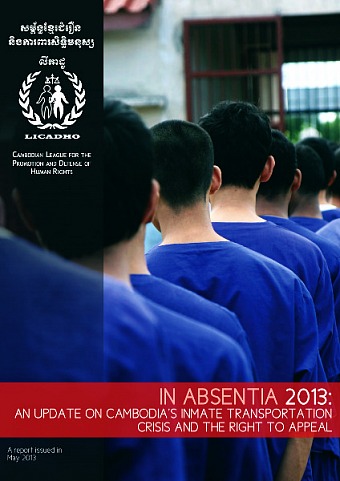Appeals Transport for Prisoners Improving, but Not Fixed Yet
Published on 29 May 2013After years of delays, prison authorities have begun transporting provincial prisoners to their appeals hearings in Phnom Penh, but the failure to offer return transport is threatening to undermine progress, a new report by LICADHO has found.
In 2010 and 2012, LICADHO reported on Cambodia’s widespread problem of in absentia appeals hearings. Due to Cambodia’s minimal inmate transportation system, hundreds – if not thousands – of prisoners were being systematically refused the right to attend their criminal appeals. Cambodian law requires the presence of the accused at appeal hearings.
The General Department of Prisons (GDP) recently reported that it provided transport for 475 provincial inmates to attend appeal hearings in Phnom Penh during 2012, and a significant number of inmates told LICADHO that they were provided transport free of charge. However, many of these inmates also said that they were not offered transport to return to their provincial prisons, or that they were asked to pay US $200 to US $300 for the privilege.
The new report finds that the stranding of provincial prisoners in Phnom Penh is problematic for a variety of reasons. One of the most obvious problems is that a wave of one-way transfers is straining Phnom Penh-area prisons, which are already some of the country’s most overcrowded. But perhaps the most critical is that prisoners often rely on family and friends to provide necessary rations of food, medicine, money and other material resources which are lacking in prison.
“Family and friends serve literally as a lifeline for prisoners,” said LICADHO Prison Supervisor Nget Sokun. “As word gets around that the appeal transport system is a one-way ticket to Phnom Penh, we are hearing that more prisoners are refusing to go.”
Cutting prisoners off from family and friends also severs their links to the community and makes them more likely to re-offend and less likely to reintegrate after being released. The report offers several case studies illustrating the difficulties faced by prisoners stranded in Phnom Penh. One inmate from Battambang faces up to five years in a Phnom Penh prison without family visits if he is not transferred back to his original prison. Two other juveniles – also from Battambang – say they have no idea how they will return home when they are released.
“We are pleased to see that GDP has begun transporting prisoners to their appeals,” said LICADHO Director Naly Pilorge. “But it is clear that work remains. Prisoners should not be afraid to attend their appeals. There should be no obstacles to them enjoying their fundamental rights in court.”
Meanwhile, the report finds, little progress has been made on other efforts that could potentially address the appeals transport crisis. LICADHO recommended in both its 2010 and 2012 reports that the government establish mobile appeals courts or regional appeals courts. Although authorities have publicly claimed that they are working on the latter option, no concrete progress appears to have been made.
For LICADHO’s previous reports on the issue of inmate transportation and appeals, please see:
- In Absentia 2012: An Update on Cambodia's Inmate Transportation Crisis & The Right to Appeal (April 2012)
- In Absentia 2010: The Right of Appeal & Cambodia's Inmate Transportation Crisis (March 2010)
For more information, please contact:
▪ Ms. Naly Pilorge, Director of LICADHO (French, English) – 012-803-650
▪ Mr. Am Sam Ath, Technical Supervisor for LICADHO (Khmer) – 012-327-770
▪ Ms. Nget Sokun, LICADHO Prison Project Supervisor (Khmer) – 016-797-305
PDF: Download full statement in English - Download full statement in Khmer
MP3: Listen to audio version in Khmer
- Related
- Topics
- Judiciary/Rule of Law Prison/Detention








